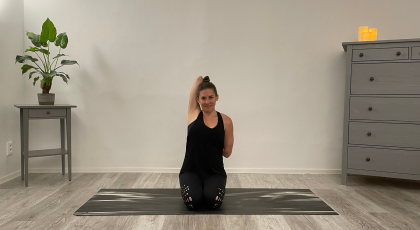View basket (0 items $0.00)
Error message
- Notice: unserialize(): Error at offset 5 of 154 bytes in variable_initialize() (line 1202 of /home/dh_6hcdc2/yogau.online/docroot/includes/bootstrap.inc).
- The file could not be created.
- The file could not be created.

New Study Shows Yoga Offers Dramatic Benefits for Chronic Pain and Depression
According to a recent study, hatha yoga and mindfulness can have profound benefits for people struggling with chronic pain and the depression that often accompanies this issue.
Chronic pain is a common and serious medical condition affecting an estimated 100 million people in the United States, which correlates with annual costs of approximately $635 billion. In the 1990s, opioids were increasingly prescribed to manage chronic pain, and this practice contributed to the opioid epidemic of the 21st century. To combat this epidemic, multidisciplinary approaches to chronic pain management are being researched and implemented.
A small-scale study was conducted in a semi-rural population in Oregon where issues of affordability, addiction, and access to care are common. A total of 28 participants aged 34 to 77 years who reported having chronic pain for at least one year were recruited from a community-based teaching hospital in Corvallis, Oregon for a pre-post study.
Study participants received 8 weeks of instruction in a mindfulness-based stress reduction program (MBSR) in 2.5-hour weekly sessions based on training people to have an awareness of the self in the present moment in a nonjudgmental manner. Afterward, techniques were self-practiced between sessions with a goal of 30 minutes per day, 6 days per week. Researchers administered pre- and post survey measurements of pain, depression, and functional capacity, and participants were asked about their satisfaction with the program content, instructor, timing, and location.
Mindfulness meditation and hatha yoga were found to benefit patients with chronic pain and depression, leading to significant improvement in pain levels, mood, and functional capacity. According to the study, published in the Journal of the American Osteopathic Association, Patient Health Questionnaire (PHQ-9) scores, a standard measure of depression, dropped by 3.7 points on a 27-point scale. Dr. Cynthia Marske, lead investigator, said some patients experience a similar drop from the use of an antidepressant. Most of the study respondents (89%) reported the program helped them find ways to better cope with their pain while 11% remained neutral.
The findings bolster other evidence that MBSR can be a useful treatment for chronic pain while improving depression. "Many people have lost hope because, in most cases, chronic pain will never fully resolve," says Marske, an osteopathic physician and director of graduate medical education at the Community Health Clinics of Benton and Linn County. "However, mindful yoga and meditation can help improve the structure and function of the body, which supports the process of healing." Healing and curing are inherently different, explains Dr. Marske. "Curing means eliminating disease, while healing refers to becoming more whole," Dr. Marske says. "With chronic pain, healing involves learning to live with a level of pain this is manageable. For this, yoga and meditation can be very beneficial."
"Chronic pain often goes hand-in-hand with depression," says Dr. Marske, who believes meditation and yoga are viable options for those seeking pain relief without pharmaceutical treatment. "Mindfulness-based meditation and yoga can help restore both a patient's mental and physical health and can be effective alone or in combination with other treatments such as therapy and medication."
Reference
Cynthia Marske, Samantha Shah, Aaron Chavira, Caleb Hedberg, Raelin Fullmer, Christopher James Clark, Olivia Pipitone, Paulina Kaiser. (2020). Mindfulness-Based Stress Reduction in the Management of Chronic Pain and Its Comorbid Depression. The Journal of the American Osteopathic Association, 120 (9): 575 DOI: 10.7556/jaoa.2020.096
Featured Courses









